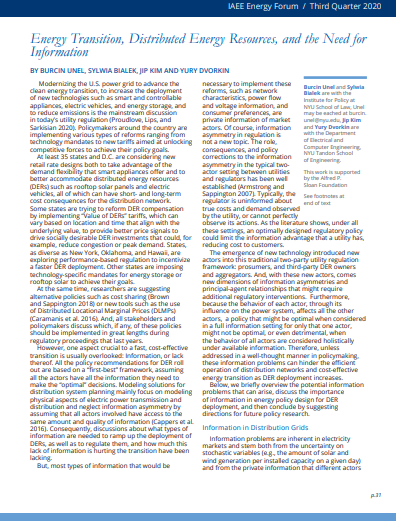-
Comments to DOE on Energy Conservation Standards for Water Heaters
The Department of Energy (DOE) asked for input on conducting its national impact analysis, including on market failures, its emissions analysis, and monetization of benefits of emissions reductions. We submitted comments suggesting that DOE continue to monetize the full climate benefits of emissions reductions using the best available estimates of the social cost of greenhouse gases.
-
Comments to DOE on Energy Conservation Standards for External Power Supplies
The Department of Energy (DOE) asked for input on conducting its national impact analysis, including on market failures, its emissions analysis, and monetization of benefits of emissions reductions. We submitted comments suggesting that DOE continue to monetize the full climate benefits of emissions reductions using the best available estimates of the social cost of greenhouse gases.
-
Amicus Brief on EPA’s Revocation of the California Auto Emissions Waiver
We filed a brief in the D.C. Circuit supporting a challenge to the Environmental Protection Agency’s (EPA) decision to revoke the waiver of preemption that allowed California (and more than a dozen states following California's standards) to set critical auto emission standards to further restrict greenhouse gases and other harmful air pollutants. EPA wrongfully concluded that it has virtually unconstrained authority to revoke a preemption waiver under Section 209(b) of the Clean Air Act. We explain how the agency overlooks key countervailing principles and misconstrues the purpose and mechanics of the waiver provision.
-
Comments to FERC on Transmission Incentives
The Federal Energy Regulatory Commission proposed changes to its electric transmission incentives, which aim to spur the deployment of technologies that enhance reliability, efficiency, and capacity of transmission facilities. We submitted comments identifying significant problems with the proposal, including its reliance on a benefit-cost ratio for project selection.
-
Energy Transition, Distributed Energy Resources, and the Need for Information
Modernizing the U.S. power grid to advance the clean energy transition, to increase the deployment of new technologies such as smart and controllable appliances, electric vehicles, and energy storage, and to reduce emissions is the mainstream discussion in today’s utility regulation. Policymakers around the country are implementing various types of reforms ranging from technology mandates to new tariffs aimed at unlocking competitive forces to achieve their policy goals. We briefly overview the potential information problems that can arise, discuss the importance of information in energy policy design for DER deployment, and then conclude by suggesting directions for future policy research.
-
Comments to DOE on Energy Conservation Standards for Motors
The Department of Energy requested input on impact and emissions analysis for upcoming energy conservation standards. We submitted comments encouraging DOE to continue to monetize the full climate benefits of greenhouse gas emissions reductions.
-
Comments to FERC on Middlesex Extension Natural Gas Project
We submitted comments to the Federal Energy Regulatory Commission (FERC) on its environmental assessment of the Middlesex Extension Project in New Jersey. FERC failed to provide a meaningful analysis of the pipeline facilities' climate effects.
-
Comments to FERC on NERA Net Metering Petition
The New England Ratepayers Association (NERA) recently petitioned the Federal Energy Regulatory Commission (FERC) to effectively overturn net metering policies nationwide. While FERC has previously and definitively answered the jurisdictional question concerning net metering, NERA asserts without evidence that controversy persists. We submitted comments describing the flaws of NERA’s argument and urging FERC to reject the petition.
-
Amicus Brief in Rio Grande LNG Case
If constructed, the Rio Grande liquefied natural gas terminal and pipeline would be responsible for greenhouse gas emissions resulting in billions of dollars in climate damages. The Federal Energy Regulatory Commission’s (FERC) analysis estimates the quantity of the project’s emissions but does not analyze the context, intensity, or significance of the incremental climate damages they will cause. We submitted an amicus brief to the U.S. Court of Appeals for the D.C. Circuit that explains how FERC’s failure to monetize the project’s climate damages using Social Cost of Carbon estimates is arbitrary.
-
Comments to Oregon PUC on the Social Cost of Carbon
Oregon Governor Kate Brown signed an executive order directing state agencies, including the Public Utilities Commission (PUC), to reduce greenhouse gas emissions. We submitted comments encouraging the PUC to use Social Cost of Carbon metrics to monetize the benefits of avoided greenhouse gas emissions.
Viewing recent projects in Climate and Energy Policy






